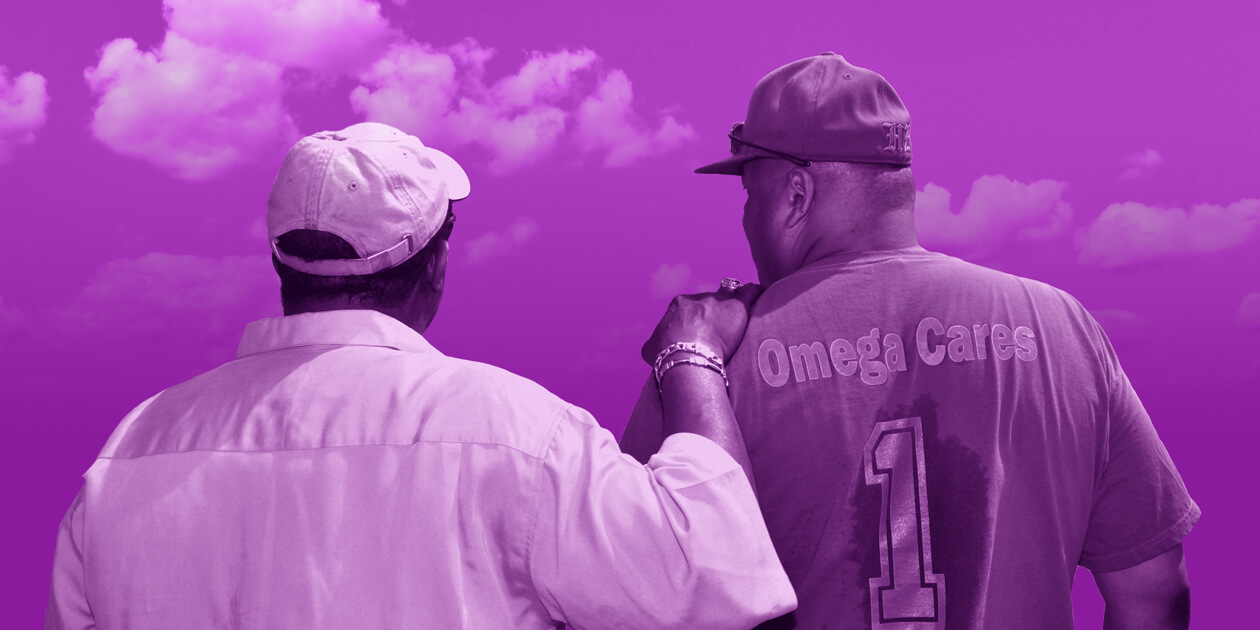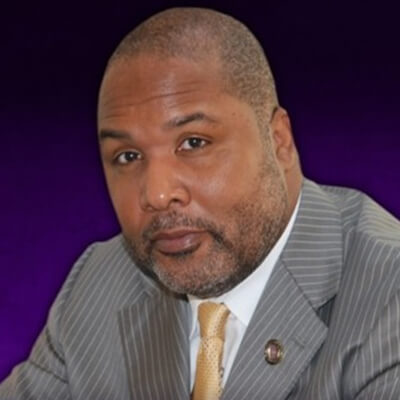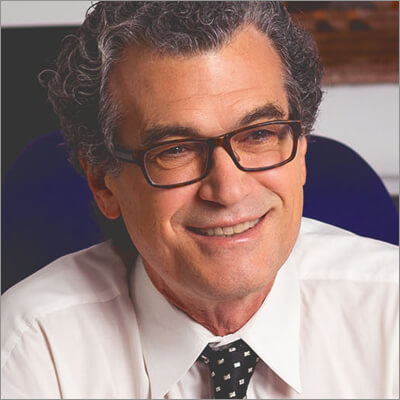Promoting Mental Health Awareness for Black Men

[ad_1]

As of 2020, more than 52 million people living in the United States struggle with mental illness. The burden of mental illness in this country is among the highest of all diseases, and mental disorders are among the most common causes of disability. Research shows that African American men with depression are significantly less likely to seek help compared with White men with depression.
In 2015, the NIMHD launched the Brother, You’re on My Mind: Changing the National Dialogue Regarding Mental Health Among African American Men (BYOMM) initiative in partnership with the historically Black Omega Psi Phi Fraternity, Inc. (OPPF) to educate and generate supportive conversations about African American men and mental health, specifically stress and depression. The initiative aims to help reduce the stigma that prevents men from asking for help—a stigma that may be intensified by notions of masculine self-reliance and within the historical context of discrimination.
OPPF was founded in 1911 at Howard University and is the first international fraternal organization founded on the campus of a historically Black college. For OPPF, membership is a lifelong commitment; the organization maintains both undergraduate and graduate divisions with chapters around the U.S. and beyond.
Through local chapters, regional and national gatherings, OPPF brings together Black communities across the country and collectively organizes to serve various social causes. The fraternity has 750 undergraduate and graduate chapters, consisting of 250,000 men in the United States, Bermuda, Bahamas, Virgin Islands, South Korea, Japan, Liberia, Germany, and Kuwait.

David E. Marion, Ph.D., the OPPF International Grand Basileus (Executive Director), was part of the original conversations to start the BYOMM initiative and has played an instrumental role since its inception. As a practicing clinical psychologist in the state of Mississippi for 30 years, he is passionate about helping individuals and families in the African American community who get overwhelmed by life. When the conversation with NIMHD began, Dr. Marion knew firsthand the need to have conversations on mental health in the Black community and the stigma that surrounded it.
Starting the Discussion About Mental Health
NIMHD’s former acting director, Yvonne T. Maddox, Ph.D., provided helpful counsel to OPPF early in the project. NIMHD leads scientific research and research training to improve health equity so that all populations have an equal opportunity to live long and healthy lives. Dr. Maddox worked with Dr. Marion and the leadership at OPPF to consider the different Black men’s health issues the fraternity could address, championed the focus on mental health, and pledged NIMHD’s support in developing the tools for the initiative based on scientific research.
Dr. Maddox recalls, “OPPF is seen among Black men as an honest broker, to be trusted and to bring ‘truth to power.’ When they speak, their voice is viewed among Black men as having authority.” She explained that OPPF helped to craft a compelling program title and resonating messages to promote the initiative and its materials. “From the beginning, we were encouraged by the professionalism of the OPPF and its well-educated and inspiring leadership,” Dr. Maddox said.
Living the Motto
The Brother, You’re on My Mind initiative focuses on the trust, sense of brotherhood, and friendships nurtured by OPPF’s founding principles of Manhood, Scholarship, Perseverance, and Uplift. Through panel discussions, articles, and educational materials, at local chapter meetings and national events, fraternity members learn the facts about Black men and the effects of depression and stress, the harm of negative stereotypes and perceptions about mental illness, and ways to support a friend or family member in crisis, and help them get treatment.
Fraternity brothers learn ways to speak up casually but meaningfully when they’re concerned about a friend’s well-being. Trusted fraternity brothers who share the values of community and mutual support may be in the best position to initiate that sensitive conversation, getting past shame or the fear of rejection to help someone they care about to open up about a mental health problem. As concerned family and friends, fraternity brothers can help break down stereotypes and speak to the mental health stressors and vulnerabilities that affect African American males.
Dr. Marion recalls the impact that mental illness was having on society could also been seen among their membership. [“We were aware] that there is mental illness in our ranks. There is depression, there is anxiety, there’s post-traumatic stress disorder, there’s substance abuse. Everything that the larger society has we have in Omega. And if we were going to live in accordance with our motto, ‘Friendship is essential to the soul,’ we needed to be better friends.”
“Even the name [of the initiative] was unique in its use of the term ‘Brother, you’re on my mind’—I’m not calling you about any foolishness or about any mess. I thought of you and I wanted to see how you were doing.”
David E. Marion, Ph.D.
International Grand Basileus (Executive Director)
Omega Psi Phi Fraternity, Inc.
The Partnership Between Omega Psi Phi Fraternity and NIMHD
NIMHD developed Brother, You’re on My Mind science-based toolkit materials to help OPPF educate its members and communities. The toolkit includes fact sheets and a presentation on depression and stress among African American men, group activity and event checklists, communication guidelines, and sample social media messages to start the conversation on mental health. NIMHD provided tools and information to help local OPPF chapters develop community partnerships and outreach, plan events, promote events and initiatives, and evaluate their progress.
Courtney F. Aklin, Ph.D., a clinical psychologist and former NIMHD chief of staff notes, “Since mental health wasn’t discussed much within African American culture, NIMHD needed to work with an organization that had access to the Black community. If the initiative was going to focus on men’s mental health, a fraternity made a lot of sense.” The combination of scientific research that NIMHD provided and the reach of 750 OPPF chapters in the U.S. and abroad was the perfect fit. Marion reflects, “Even the name [of the initiative] was unique in its use of the term ‘Brother, you’re on my mind’—I’m not calling you about any foolishness or about any mess. I thought of you and I wanted to see how you were doing.”
Changes Resulting from the Dialogue
Once local fraternity chapters got acquainted with the Brother, You’re on My Mind initiative, it changed the culture. Brothers now include a routine wellness check at the end of their meetings, after conducting business, just to see how fellow “Omegas” are doing. At meetings they now direct members to the resources on the Brother, You’re on My Mind page on the OPPF website.
Some brothers voluntarily speak on their mental health experiences at OPPF meetings and have developed support groups where they encourage each other to keep up with medication and treatment. They recall the embarrassment and difficult feelings they had when they first confronted their mental health problems, but also talk about how much better they are feeling since they got help. Others speak out about the pain of suicide in their families, and the need to recognize and reach out to people struggling with depression.
“Through our informal assessments, we’ve seen changes in awareness and perceptions about stress and depression after attending the BYOMM events, which is encouraging news,” said Shelly Pollard, outreach coordinator at NIMHD.
At the national level, OPPF has taken time for group check-ins at annual undergraduate summits each January since the start of the initiative. It has become part of discussions on leadership training—the importance of taking care of yourself.
Dr. Marion found that it was useful to have already established the BYOMM initiative when the COVID-19 pandemic came along. Resources, connections, and conversations were already in place when the additional stresses and tragedies of COVID grew to affect everyone. Mental health needed to be addressed more than ever.
At NIMHD, staff also noted a substantial increase in visits and toolkit downloads on the initiative’s webpage, particularly during the early days of the pandemic. “The opportunity to have these resources available at such a crucial time was a testament to the importance of this initiative,” said NIMHD’s Communications Director Kelli Carrington.
On OPPF’s April 1, 2020 International Prayer Call, Dr. Marion issued the Brother You’re on My Mind Challenge, asking that each brother of Omega Psi Phi Fraternity, Inc. call and check on at least four brothers every Wednesday. “Brothers heeded the call and we’ve seen the restoration of hope and commonality of spirit during this time.” said Dr. Marion. Watch a video highlighting the call.
In October 2020, ESSENCE magazine published an article about Black men and mental illness, covering the OPPF/NIMHD partnership and the Brother, You’re on My Mind initiative. This high-profile article brought national attention to the issues of mental health, stigma, and Black men.

“The Brother, You’re on My Mind partnership with the Omega Psi Phi Fraternity, Inc. has done a remarkable job helping to start conversations about mental illness in the Black community,” said NIMHD Director Eliseo J. Pérez-Stable, M.D. “NIMHD’s role was to explain the science behind mental illness and how African American men can maintain mental health in an easy-to-use toolkit, while the Omega Psi Phi Fraternity recruited their members to disseminate these important messages through national, regional, and local efforts. This combination of science, community, and heart made the program successful.”
The Brother, You’re on My Mind initiative has been a stellar example of an outreach partnership. It has helped to raise awareness and touched the lives of many. NIMHD thanks the OPPF leadership and members for their continued efforts to reduce the stigma of mental illness, depression, and stress, help brothers and loved ones who are struggling, and find resources for additional care when needed.
Page updated July 18, 2022
[ad_2]
Source link
